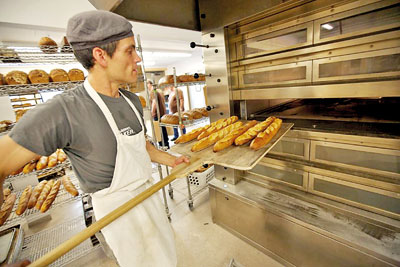How King Arthur Flour’s Unusual Leadership Structure Is Key To Its Success
View(s):In 2004, the leadership of King Arthur Flour gathered to formally sign over control from longtime owners Frank and Brinna Sands to the company’s employee stock ownership programme (ESOP). The two had been gradually transferring shares in the Norwich, Vermont, flour maker to the ESOP since 1996 as part of a long-planned exit. Opposed to selling the company to outside buyers or extended family members, the Sands had instead worked with then-vice president of finance Steve Voigt to engineer a transfer of ownership to their own employees, a surefire way to keep the company close to its roots in small town Vermont. Now they were ready to conclude the deal that was nearly a decade in the making. Surrounded by lawyers and the ESOP leadership, including current co-CEO Suzanne McDowell, Frank Sands signed over his family’s company.
 The gravity of the moment was at odds with King Arthur’s casual culture, and McDowell remembers being momentarily taken aback. “The room felt like it was a bunch of men in suits,” she recalls. That is, until Frank Sands, in customarily comic fashion, shot her a wink from across the room.
The gravity of the moment was at odds with King Arthur’s casual culture, and McDowell remembers being momentarily taken aback. “The room felt like it was a bunch of men in suits,” she recalls. That is, until Frank Sands, in customarily comic fashion, shot her a wink from across the room.
Honoring Sands leadership, the flour company, which dates back to the 18th century, has made a concerted effort to stick to its small-town identity despite its growing profile. Employee ownership is the cornerstone of a broader set of goals the company has formally enshrined since voting to become a B Corporation in 2007. (B Corps—including companies such as Patagonia and Ben & Jerry’s—legally obligate their boards of directors to balance profit along with impact on employees and community.) Fittingly, the company has adopted an equally unconventional leadership structure.
When Voigt, who had been promoted to CEO in 1999, stepped down in July 2014, the board approached McDowell along with her colleagues Karen Colberg, Ralph Carlton and Michael Bittel with an unusual proposal: co-leadership. Each person would rule his or her own domain—marketing and retail for Colberg, HR and IT for McDowell, finance for Carlton, general operations for Bittel—and work collaboratively to determine larger strategic goals. Executive decision-making would be shared, and, according to Colberg, the arrangement has turned out to be painless. The four co-leaders had served on the strategy team with Voigt and so had experience working together.
“Not being a public company but being employee-owned, we had the ability to try things,” says Colberg, who now shares leadership responsibilities with McDowell and Carlton (Bittel left King Arthur at the end of 2014).
So far, the strategy has seemed to work, even though some may have had doubts about the shared leadership arrangement. “There’s a healthy amount of skepticism around the co-leadership, that it doesn’t sound nimble,” says McDowell. But, she explains, “we’re continuing to evolve.”
Since 1996—the year the ESOP was launched—King Arthur has grown from 20 employees to 389, and revenue for 2018 exceeded $140 million, a 12% increase from 2017. Thanks to renewed interest in baking, as evidenced by The Great British Baking Show and other pop culture phenomena, the market for home baking has grown substantially. McDowell and Colberg are quick to attribute their success to the company’s culture and to the sense of ownership felt by employees.
Because of the ESOP, notes McDowell, “the pride that people bring to their work … whether it’s the coffee they’re making, the baguettes they’re shaping, the boxes they’re shipping, is incredible.”
“It definitely takes tending, our culture,” adds Colberg. “It’s a living, breathing thing.”


